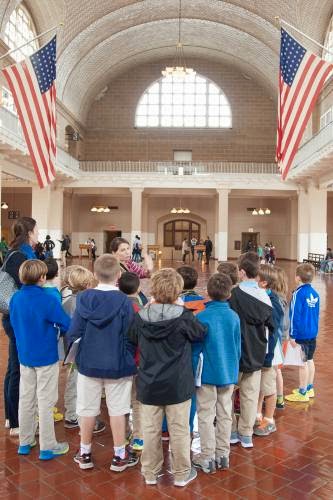 |
| At Ellis Island |
This is an active unit involving extensive learning beyond the classroom, close examination of primary sources, and cultivation of creativity.
It began in October when, after studying immigration history, trends and reasons in class, the boys visited Ellis Island where they explored primary sources and artifacts.
Then just last week, the boys engaged in a Mock Ellis Island activity in which they assumed the identities of immigrants going through all the steps of immigration processing, from being interviewed by health, education, and character inspectors, to experiencing the thrill of being "admitted," to the disappointment of being "quarantined" or "deported."
 |
| Immigrant undergoing processing during Mock Ellis Island. |
Through all of these activities, our boys develop an appreciation for the immigrant experience and begin to examine the many aspects of how we define culture and the contribution of immigrants to it. The boys will then use this foundation during the winter term, as they study the cultures of Haiti and South Korea, and engage in a related research project.
 |
| Admitted immigrants take oath of loyalty. |
It is equally vital that our boys, as citizens of the world, begin to understand and appreciate the various, and at times complex, similarities and differences among cultures, countries and societies around the topic of immigration.
Comments
Post a Comment